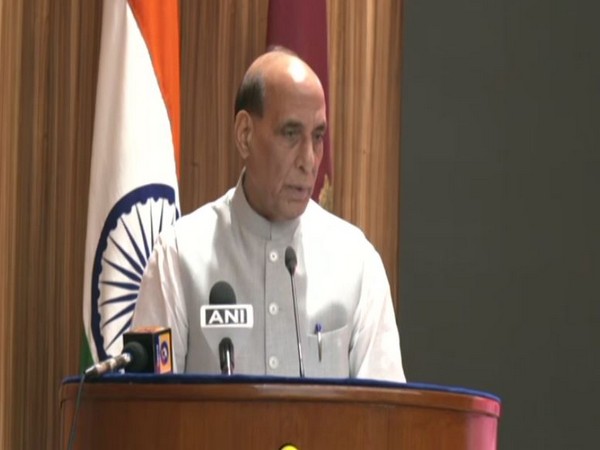Some irresponsible nations with hegemonic tendencies twisting definition of UNCLOS: Rajnath Singh
Taking a dig at China, Defence Minister Rajnath Singh on Sunday said some irresponsible nations with their narrow partisan interests and hegemonic tendencies are coming up with wrong definitions of the UN Convention on the Law of the Sea UNCLOS.It is a matter of concern that UNCLOS is being repeatedly weakened by arbitrary interpretation of its definition by some nations, Singh said, after commissioning of Indian Navys destroyer Visakhapatnam here.As a responsible maritime stakeholder, India supports consensus-based principles and a peaceful, open, rules-based stable maritime order, Singh said.

- Country:
- India
Taking a dig at China, Defence Minister Rajnath Singh on Sunday said ''some irresponsible nations'' with their narrow partisan interests and hegemonic tendencies are coming up with wrong definitions of the UN Convention on the Law of the Sea (UNCLOS).
It is a matter of concern that UNCLOS is being repeatedly weakened by arbitrary interpretation of its definition by some nations, Singh said, after commissioning of Indian Navy’s destroyer Visakhapatnam here.
As a responsible maritime stakeholder, India supports consensus-based principles and a peaceful, open, rules-based stable maritime order, Singh said. India envisages Indo-Pacific having freedom of navigation, free trade, and universal values where all stakeholders’ interests are protected, he said.
''Some irresponsible nations, with their narrow partisan interests, hegemonic tendencies are coming with wrong definitions of international laws,'' Singh said without naming China.
China has been militarizing islands in South China, a move that has attracted global criticism. The area has overlapping claims of several East and Southeast Asian nations.
In 2016, an international tribunal rejected China’s argument that it enjoys historic rights over most of the South China Sea -- a region known to be rich in hydrocarbons and also hosting an important Sea Lane of Communication.
Following the order, China said the award is ''null and void and has no binding force'' and it neither accepts nor recognizes it.
Singh said as an important country in the region, the Indian Navy's role assumes a more crucial role for the region's security.
He said countries the world over are working towards making their military power strong and modern due to global security reasons, border disputes, and the importance to maintain maritime dominance.
There is a rising demand for military equipment. Reports suggest that the world over the cost for security is expected to reach USD 2.1 trillion. In 5-10 years, this is expected to rise manifold, Singh noted.
''We have an opportunity to use all our capacity, take advantage of the policies, and make the country a hub in indigenous shipbuilding,'' Singh said.
Indigenously-built stealth-guided missile destroyer Visakhapatnam, packed with an array of missiles and anti-submarine rockets, was commissioned in presence of top naval commanders.
Visakhapatnam is equipped with lethal weapons and sensors, including supersonic surface-to-surface and surface-to-air missiles, medium and short-range guns, anti-submarine rockets, and advanced electronic warfare and communication suits, officials said.
Admiral Karambir Singh, Chief of the Naval Staff, said the ship is a shining example of self-reliance.
(This story has not been edited by Devdiscourse staff and is auto-generated from a syndicated feed.)










